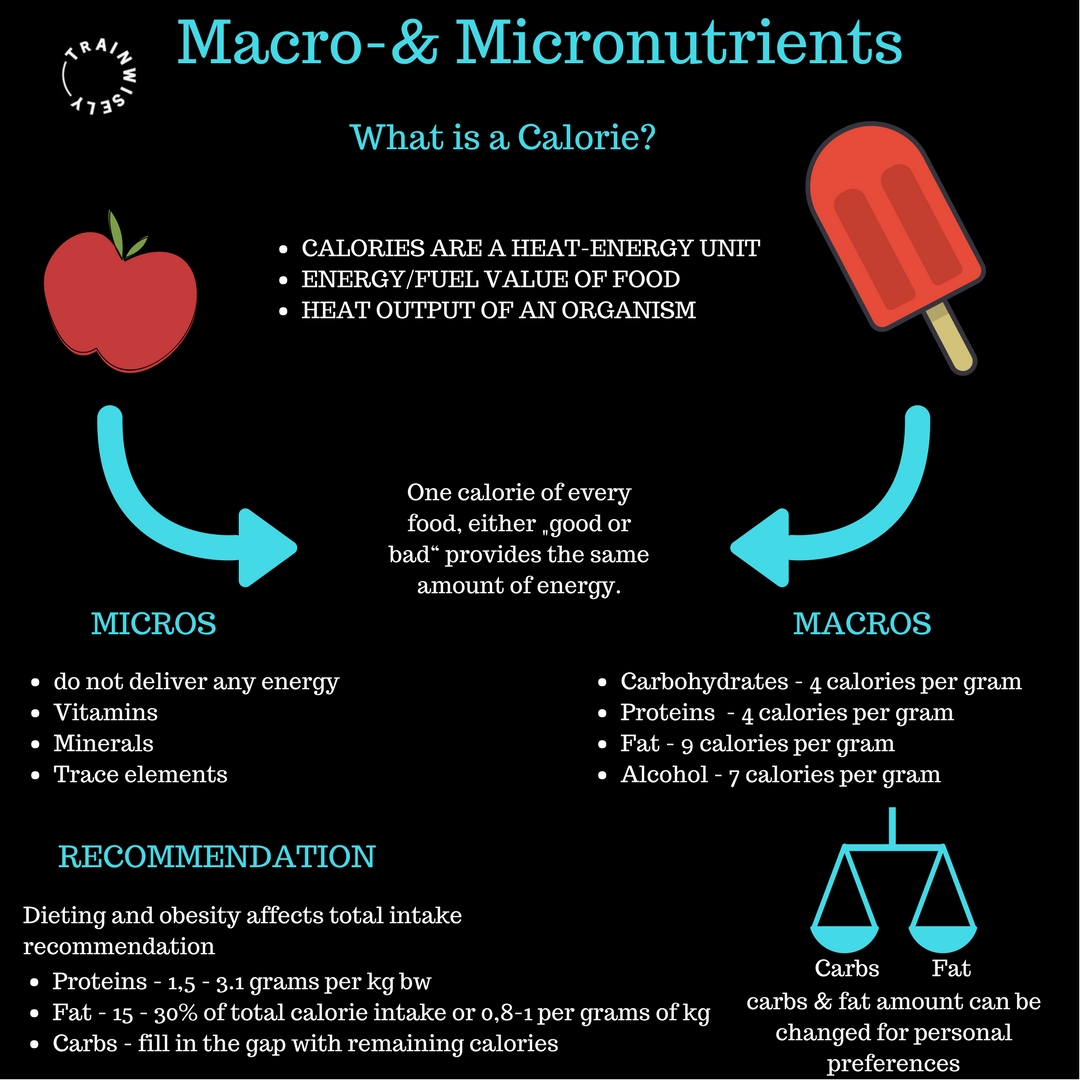
Actually before we start to tell you everything about the optimal nutrition, diets, IIFYM („if it fits your macros“) and myths, we will try to explain the basics around macro- and micronutrients. To get a feeling about the amount of calories someone consumes, we like to introduce almost everybody to this concept. Despite the following strategy is the most accurate one to handle your weight, remember that tracking food so precisely is not a long term solution for everybody. We will cover other strategies too.
MACROS
There we have a total of 4:
-Carbohydrates (Carbs) with 4 calories per gram
-Proteins with also 4cal/gr
-Fat with 9cal/gr
-Alcohol with 7cal/gr which we don't actually need right now.
MICROS
do not deliver any energy
-Vitamins
-Minerals
-Trace elements
CALORIES
What is a calorie actually? Are all the calories from different sources the same? Calories are a heat-energy unit. The heat output of an organism and also the energy/fuel value of food. Based on that, we can say that one calorie of every food, either „good or bad“ provides the same amount of energy.
BASIC RECOMMENDATION
Trying to give someone or yourself strict recommendation about calories and macronutrients is not the right way. First of all, what is your goal? Loosing weight, gaining weight and building muscle or even both as a beginner?
Try to calculate your basal metabolic rate (BMR), which is the energy required to stay alive with no activity. The metabolic rate varies between individuals. Based on gender, age, bodyweight and height you can somehow get your BMR calories. There are dozens of sites and methods to calculate it (this can vary by as much as 30% though). A good way to estimate this for most people would be to first take your bodyweight in pounds and multiply it by 10 (or multiply your bodyweight in kilograms by 22) and then multiply that value by an activity multiplier (1.3-2.2). That is how to get your active metabolic rate (AMR). Those calories are the ones you expend throughout the day, by different activities (walking, running, training, reading, cleaning etc.). This can significantly vary on daily basis. Keep your activity level as high as possible, if loosing weight is your main goal.
Now you have your BMR and AMR calories, add them together and voila that's your total calorie consumption every day. Of course it's just estimated, but it's a start. Based on your goal you either add 100-300 calories on top to gain weight and vice versa for losing. Track it for one to two weeks and the scale should tell you, if you calculated right. Play around with the calories and adjust it for your own preferences.
EXAMPLE
Male, 200lbs, lightly active,
goal: weight maintenance 200 x 10= 2.000 BMR 2000 x 1.6 = 3.200 AMR. If that male now manages to track his food very precisely, and sees weight loss on the scale, it means he probably is more active than he calculated. In this scenario he would add 100-200 calories till he finally is able to uphold his weight on the scale.
In the next article we are going to talk about overall nutrition, from which sources we should pick our food and how an overall good eating habit looks like.
Stay tuned, repost, follow and TRAIN wisely.
Congratulations @trainwisely! You have completed some achievement on Steemit and have been rewarded with new badge(s) :
Click on any badge to view your own Board of Honor on SteemitBoard.
For more information about SteemitBoard, click here
If you no longer want to receive notifications, reply to this comment with the word
STOPDownvoting a post can decrease pending rewards and make it less visible. Common reasons:
Submit